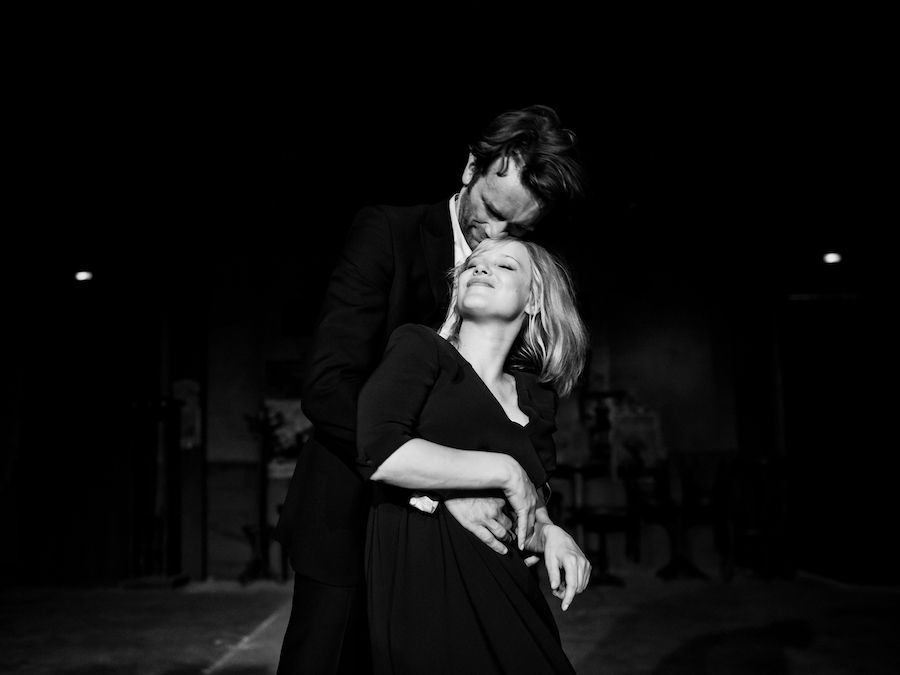‘Cold War’ tells a haunting, bittersweet love story set against a Polish backdrop
March 6, 2019
This piece discusses suicide and includes spoilers for the movie ‘Cold War.’
In a brisk 89 minutes, “Cold War” makes you feel like you’re falling in love for the first time again. And it does so through another language, and in black and white.
Nominated for three Academy Awards, the Polish movie unfurls a romantic epic spanning decades. Starting in the aftermath of World War II in Poland, the film follows a man and a woman as they fall in and out of love in a repressive world.
The man, Wiktor, is a composer who seeks to find Polish folk songs and share them with a wider audience. He and his colleague Irena set up an academy in an abandoned church, where they invite people to train a traveling ensemble. There, Wiktor meets Zula, who auditions with an earthy, raw singing voice.
The rest of the movie unfolds like a dance, with Wiktor and Zula revolving their lives around and teasing each other, falling apart then coming together. The tension and sorrow that always lie between them propel the movie forward. Wiktor, a soulful idealist, struggles against the rigid Soviet authority that oversees the traveling ensemble and yearns to escape Poland. Zula, a realist, just wants to survive, and is willing to go along with the government’s demands to sing odes about Stalin.
So, when the two get an opportunity to escape to West Berlin, it’s not surprising that Zula stays behind with the troupe and she and Wiktor separate. But it hurts, because we feel like Wiktor and Zula would flourish together in another world, one where they don’t have to worry about the Soviet government, one where they can focus on creating the music they want to.
Alas, writer-director Pawel Pawlikowski strings us along their tumultuous journey. The black-and-white cinematography is stunningly beautiful, and it serves to further emphasize the dreariness of the world the characters inhabit. Without vibrant, playful colors that shout for attention, you can focus on the poetry of the Polish language and its music.
A scene I haven’t forgotten since I left the theater is one where the camera follows Zula floating down a river as she sings a Russian love song. The shot follows Wiktor and Zula having an argument, and Zula jumps in the river as an act of defiance. But much like the song itself, the calming, strong way she sings it reflects the movie’s overall tender, touching side, even as it contrasts its spikier, brutal tone.
The music is rich, genuine and haunting, pulling forth buried emotions and unwanted tears. “Cold War” explores the intersection of love and music, and how expressions of love can manifest through the form. The fact that there is no clear, generalizable message about that intersection doesn’t make the movie any less beautiful or any less touching.
In that way, it’s similar to 2018’s beloved hit, “A Star is Born.” Both films use music to construct vivid love stories with real, flawed characters, and both look at how the production of music reflects love. “Cold War” differs in that the atmosphere is a major plot drive: Wiktor and Zula have to struggle against both their personal desires and those of the Soviet government.
Another, this one unfortunate, similarity between the two movies is that both involve suicide. “Cold War” ends with the couple taking cyanide pills together, tired of dealing with the world’s problems and wanting to die together. It feels like a cop-out, a too-neat solution tacked onto an otherwise complexly woven story.
Even more importantly, such a portrayal of suicide continues to romanticize it and portrays it as inevitable. The choice feels like a sucker punch because it comes out of nowhere — up until it happens, the movie doesn’t grapple with questions of suicide, and it ends too suddenly to leave any room for unpacking the characters’ motivations.
But such an ending shouldn’t completely rule out watching the movie, because it’s still so beautifully human.
Ultimately, Wiktor and Zula are forced to deal with questions of their national and artistic identities, who they are and who they want to be. Maybe that’s why the film is so resonating; it asks us to question what it means to love someone when you’re still figuring out who you are yourself.
“Cold War” will be available on Amazon Prime starting March 22.
Email: dvesurai@u.northwestern.edu
Twitter: @dvesurai

